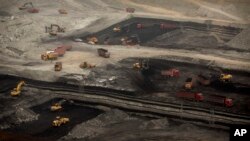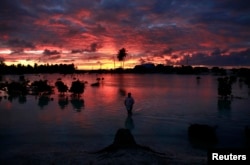The president of the Pacific Island nation of Kiribati is urging world leaders to ban new coal mines. On a visit to Australia, Anote Tong said his island nation is "running out of time" in its fight against the effects of climate change, including rising sea levels.
The Kiribati archipelago is a member of the Climate Vulnerable Forum, a grouping of 40 nations considered most at risk from the effects of climate change.
It has called for a new United Nations deal, due to be agreed in Paris next month, to limit temperature rises to 1.5 degrees Celsius, warning over a billion people are in danger.
Among them are about 100,000 islanders in Kiribati, one of the least developed countries in the South Pacific, where rising sea levels threaten to consume low-lying communities.
On a visit to Australia, Kiribati President Anote Tong warned that if drastic action is not taken, his and other vulnerable nations, including Tuvalu, the Marshall Islands and the Maldives could disappear under the waves.
Tong said new coal mines should be banned in a radical effort to limit greenhouse gas emissions.
“We are running out of time and I think we need to be focusing on some concrete course of action. And yes, I believe it is reasonable. I know, I am aware of the arguments that are being put forward, but I think what is realistic is that, it is not being suggested that the use of coal be immediately stopped," he said. "That would be unreasonable. But I think if we are serious about transitioning to renewable energy, then one of the very realistic steps is maybe to look at reviewing our decisions to open new coal mines.”
Canberra has previously rejected calls for a moratorium, claiming it would not help "one iota" if Australia were to stop all of its coal exports.
Australia is one of the world’s leading coal-exporting nations, and the fossil fuel generates a majority of Australia’s electricity.
Prime Minister Malcolm Turnbull will attend next month’s climate conference in Paris. His government has pledged to reduce Australia’s greenhouse gas pollution by at least 26 percent of 2005 levels within the next decade-and-a-half, with the possibility of cutting it further if there is no adverse effect on the national economy.





